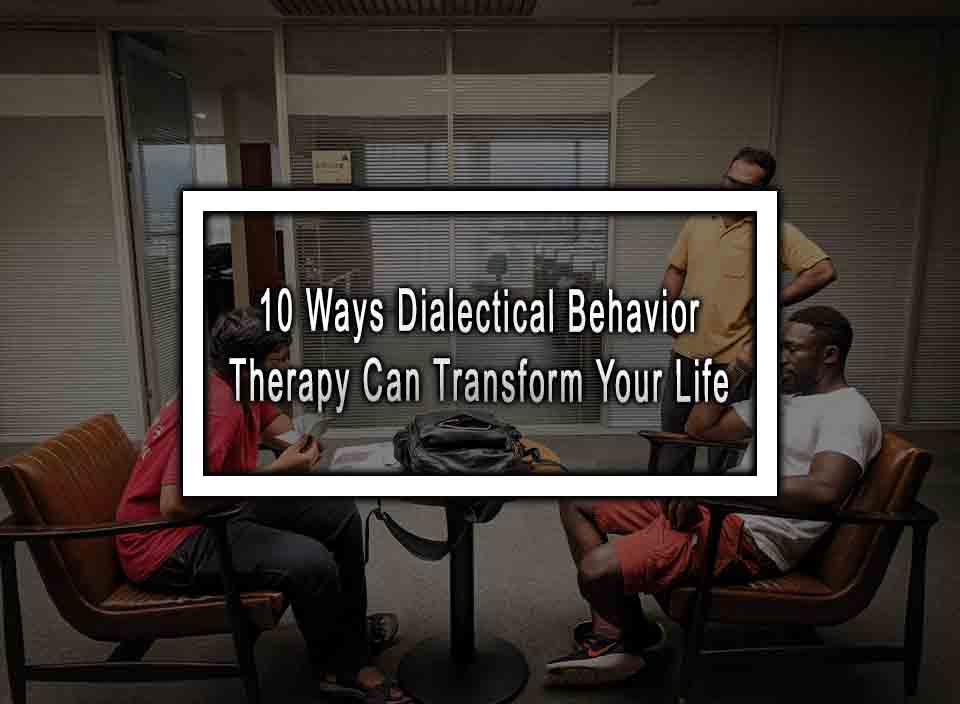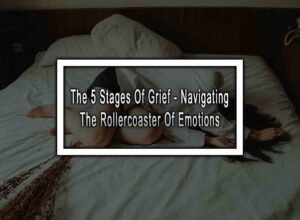Table of Contents
ToggleReady to Kick Anxiety and Master Your Emotions? Say Hello to Dialectical Behavior Therapy!
Dialectical Behavior Therapy (DBT) is a powerful therapeutic approach that can truly overhaul your life. Combining elements from cognitive-behavioral therapy (CBT) and mindfulness practice, DBT equips individuals with essential skills to manage emotions, improve relationships, and navigate life’s challenges like a pro. This article uncovers the top 10 ways DBT can transform your life, offering practical insights and empowering techniques to lead you toward a healthier and happier future.
1. Mastering Emotional Regulation
DBT provides a comprehensive toolkit that helps individuals regulate their emotions effectively. By learning specific skills such as identifying emotions, identifying triggers, and implementing healthy coping strategies, DBT empowers you to take control of your emotional well-being.
2. Enhancing Interpersonal Effectiveness
DBT emphasizes the development of interpersonal effectiveness skills, which enable you to communicate your needs effectively, set healthy boundaries, and establish fulfilling relationships. Say goodbye to toxic dynamics and hello to healthier connections!
3. Taming the Anxiety Monster
Anxiety can be debilitating, but with DBT, you can conquer the anxiety monster head-on. By focusing on distress tolerance and mindfulness techniques, DBT equips you with the tools necessary to manage anxiety and regain control of your life.
4. Harnessing the Power of Mindfulness
Mindfulness lies at the core of DBT. By practicing mindfulness, you learn to live in the present moment, let go of judgment, and cultivate inner peace. Discover the transformative benefits of mindfulness and unlock the full potential within yourself.
5. Effective Emotional Problem-Solving
No more feeling overwhelmed by life’s challenges! DBT equips you with skills to approach problem-solving in a structured and effective manner. Say hello to practical strategies that allow you to navigate obstacles, make informed decisions, and find your path toward personal growth.
6. Building Emotional Resilience
Life throws curveballs, but DBT teaches you how to bounce back stronger than ever before. Through skills like radical acceptance and building positive experiences, you can develop emotional resilience, allowing you to face setbacks head-on and emerge victorious.
7. Transforming Negative Self-Talk
Negative self-talk can be damaging, impacting your self-worth and mental well-being. DBT helps you challenge and reframe those negative thoughts, allowing you to cultivate self-compassion, improve self-esteem, and realize your true worth.
8. Finding Balance
DBT teaches the importance of balancing an emotional mind (where intense emotions rule) and a reasonable mind (where logical thinking prevails). Master the art of finding the wise mind, where emotions and logic coexist harmoniously, leading to better decision-making and more centered life.
9. Breaking Free from Self-Destructive Behaviors
As DBT was initially developed to treat individuals with borderline personality disorder, it’s highly effective in helping people break free from self-destructive behaviors. Learn how DBT assists in overcoming addictions, self-harm, and other harmful habits, putting you back in control of your life.
10. Embracing Life’s Challenges
Finally, DBT teaches you to view life’s challenges as opportunities for growth. By embracing painful experiences and turning them into valuable lessons, you embark on a journey toward personal transformation and resilience.
Conclusion
Dialectical Behavior Therapy is a game-changer when it comes to enhancing emotional well-being, managing relationships, and navigating life’s hurdles with grace. By investing time and effort into learning and implementing these life-transforming skills, you can rewrite your story, building the life you’ve always dreamt of. Say yes to DBT and unleash your true potential today!
Dialectical Behavior Therapy FAQ
Here are the most common questions about dialectical behavior therapy.
1. What is the goal of Dialectical Behavior Therapy?
The main goal of DBT is to help individuals develop skills to effectively manage their emotions, tolerate distress, improve interpersonal relationships, and live a life worth living. DBT emphasizes the balance between acceptance and change, focusing on accepting oneself while also striving for personal growth and behavioral change.
2. What are the main components of Dialectical Behavior Therapy?
DBT consists of four main components: individual therapy, group skills training, phone coaching, and a therapist consultation team. Individual therapy allows clients to work with a therapist on specific problem areas and develop personalized strategies for coping. Group skills training focuses on teaching specific skills such as mindfulness, emotion regulation, distress tolerance, and interpersonal effectiveness. Phone coaching allows clients to contact their therapist outside of sessions for support and guidance. Therapist consultation teams are composed of DBT therapists who meet regularly to support each other in providing effective treatment.
3. What are some of the skills taught in Dialectical Behavior Therapy?
DBT teaches a variety of skills, including mindfulness (being present in the moment without judgment), emotion regulation (identifying and managing emotions), distress tolerance (coping with intense emotions without engaging in harmful behaviors), and interpersonal effectiveness (communication and relationship skills). These skills are taught through specific techniques, exercises, and homework assignments.
4. Who can benefit from Dialectical Behavior Therapy?
DBT was originally developed to specifically target individuals with borderline personality disorder (BPD), as they often struggle with emotional dysregulation and self-destructive behaviors. However, DBT has since been adapted for the treatment of various mental health issues, including depression, anxiety disorders, substance abuse, eating disorders, and even individuals without a specific diagnosis but who struggle with emotional and behavioral difficulties.
5. How long does Dialectical Behavior Therapy typically last?
The duration of DBT can vary depending on the individual and their specific needs. On average, DBT treatment can last anywhere from six months to a year, or even longer in some cases. The therapy typically consists of weekly individual sessions, weekly group skills training sessions, and ongoing phone coaching as needed.












